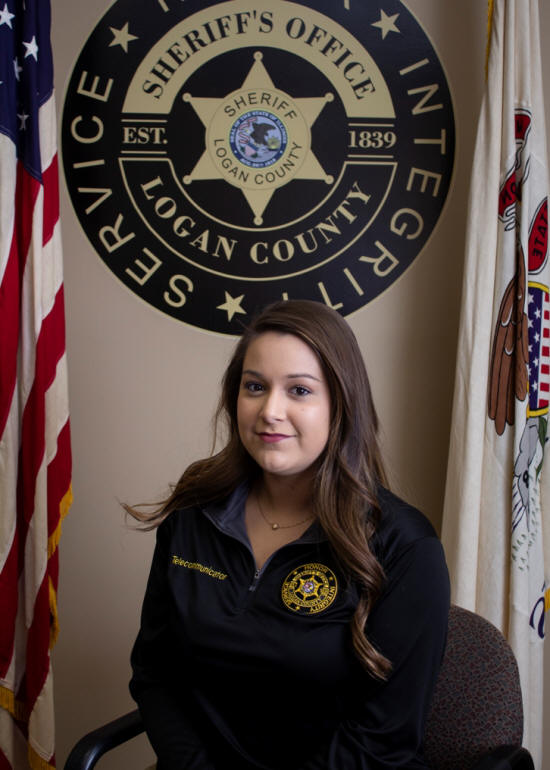|
 Logan Dispatch was founded in 2004. Prior to the
formation of Logan Dispatch the city of Lincoln and Logan County
would hire their own dispatchers or those positions were filled by
law enforcement personnel. Logan Dispatch consolidated the entities
as one under the governance of the Emergency Telephone Systems Board
(ETSB). Logan Dispatch was founded in 2004. Prior to the
formation of Logan Dispatch the city of Lincoln and Logan County
would hire their own dispatchers or those positions were filled by
law enforcement personnel. Logan Dispatch consolidated the entities
as one under the governance of the Emergency Telephone Systems Board
(ETSB).
Logan Dispatch started with eight full-time professional trained
dispatchers, one supervisor, a director and deputy director of both
EMA (Emergency Management Agency) and 911. Then in 2019 an ordinance
was passed, and Logan Dispatch became a department under the
Sheriff’s Office.
Today, the department has eight full time telecommunicator
positions, two floor supervisor positions, a 911 coordinator and an
operations manager. The 911 coordinator primarily deals with
equipment and acts as liaison to the Emergency Telephone Systems
Board (ETSB). The operations manager manages the personnel and the
daily operation of the Emergency Communications Center.
The State of Illinois mandates that all Public Safety Answering
Points (PSAPs) answering emergency medical calls must be certified
in Emergency Medical Dispatch (EMD). In 2005, Logan Dispatch started
using Priority Dispatch to fulfil that mandate. All
telecommunicators are certified by the International Academies of
Emergency Dispatch (IAED) and are licensed through the Illinois
Department of Public Health to preform emergency medical dispatch
services and go through Memorial Health Systems as our medical
provider. Logan County telecommunicators must recertify with IAED
every two years and relicense every four years with Illinois
Department of Public Health.

The Medical Priority Dispatch System (MPDS) is a unified system used
to dispatch appropriate aid to medical emergencies including
systematized caller interrogation and pre-arrival instructions.
Priority Dispatch MPDS includes 36 protocols - each built by
experts, backed by science, and tested over time - that reduce
complexity and risk. The system has over 40 years of the emergency
protocols being used and, in the U.S., alone 153 of the top 200 most
populous cities use it. Priority Dispatch MPDS offers the full
package; structured emergency medical call taking, training,
certification, and continuing education, and quality assurance and
improvement program.
Logan Dispatch has utilized this protocol through the use of card
sets kept at each dispatch position in the communicators center.
Langley said, “However, with advancements in technology we are proud
to announce that we will be implementing Priority Dispatch's ProQA
Dispatch Software later this year.”
ProQA integrates the power of the International Academies of
Emergency Dispatch protocols with today's critical computer
technologies. ProQA will allow our Telecommunicators to move
smoothly through questioning, quickly identify determinant codes
that are provided to responders, and then guides them through
relevant post-dispatch and pre-arrival instructions. “We are excited
to work with Priority Dispatch to implement this upgrade and look
forward to how it will benefit not only the way we preform our jobs
but the service we provide for the citizens of Logan County,”
Langley said.
[Rebecca Langley, Operations Manager, Logan Dispatch]
[to top of second column] |

Today’s helpful tips come from Sydney Zamora and Suzi
Gasparini and both focus on one topic.

Sydney Zamora
Lots of people believe that when they dial 911, the dispatcher on
the other end of the line automatically knows their location. Like
anything else, technology on our end can fail and it is always best
to keep an eye on your surroundings. If you have a Smart Phone and
are stuck in a situation where you do not know your location, you
can open your Google and type "where am I?" and Google should give
your location and you can pass that on to the emergency
telecommunicator.
Also, with recent changes to area codes in our area there has been
some concern as to whether you need to dial an area code ahead of
dialing 9-1-1. There is no need to dial an area code prior to 9-1-1.
When calling from a landline you will automatically be connected to
your local Emergency Dispatch Center. When calling from a cell phone
it depends on what cell phone tower you hit as to what Emergency
Dispatch Center you reach. Just advise the Emergency
Telecommunicator of your location and they can transfer to the
appropriate Emergency Dispatch Center.

Suzi Gasparini
Location, location, location is not only important in real estate.
It is also singularly the most important piece of information you
can provide in any emergency. Your location can determine what
jurisdiction you are in and therefore what agency will respond to
your emergency. We cannot send you help if we do not know where you
are. We have several tools at Logan Dispatch that we can use to help
us verify your location but with technology it can always have its
faults. So, we rely on you, the caller, to let us know where the
emergency is located. You the caller are our most important tool,
and the location is the most important information.

In Logan County the rural roadways are set up in a grid. “Streets”
run east/west, while “avenues” run north/south. Therefore, it is
important to know if you are on a street or an avenue. Advising of
the wrong one can mean a difference of several miles or the complete
opposite side of the county.
We know reporting an emergency situation is stressful and we are
here to help you. The best thing you can do is remain calm, answer
our questions, and follow the instructions we provide. |